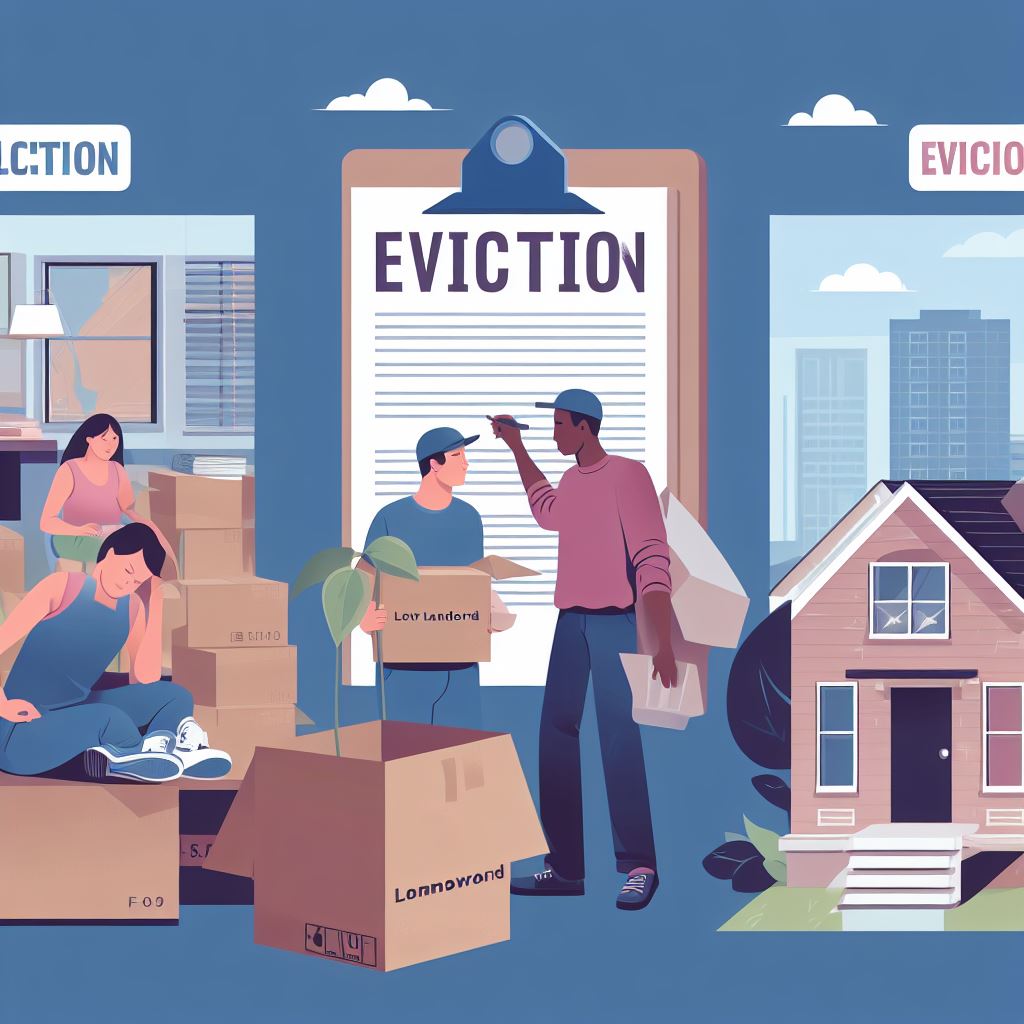Three Key Steps in Navigating Eviction From Affordable Homes

Imagine facing the daunting challenge of eviction from your affordable home.
In this article, we will guide you through three key steps to navigate this difficult process.
First, you must understand your rights as a tenant.
Next, we will explore alternative housing options to help you find a new place to call home.
Finally, we will discuss seeking financial assistance and finding legal support to ensure you have the resources you need.
Let’s begin this journey together.
Key Takeaways
- Familiarize yourself with eviction laws and your rights as a tenant
- Seek legal support promptly to defend against eviction
- Explore alternative housing options and consider negotiating with your landlord
- Research and seek financial assistance to help navigate the eviction process
Understanding Your Rights
You need to familiarize yourself with your rights when facing eviction from affordable homes. Understanding your rights is crucial in navigating this challenging situation. When it comes to affordable housing, there are specific laws and regulations in place to protect tenants. By knowing and asserting your rights, you can better protect yourself and potentially avoid eviction.
First and foremost, familiarize yourself with the laws governing eviction in your jurisdiction. Each state or region may have different rules and procedures, so it’s essential to understand the specific guidelines that apply to your situation. This knowledge will empower you to make informed decisions and take appropriate action.
Secondly, be aware of your rights as a tenant. These rights may include the right to proper notice before eviction, the right to a fair hearing, and the right to remain in your home under certain circumstances. Understanding these rights will help you assert your position and potentially challenge an eviction if necessary.
Lastly, seek legal assistance if you find yourself facing eviction. An attorney who specializes in housing law can provide invaluable guidance and representation throughout the eviction process. They can help you understand your rights, navigate legal proceedings, and advocate for your best interests.
Exploring Alternative Housing Options
Consider exploring alternative housing options when facing eviction from affordable homes. While eviction can be a difficult and stressful experience, it is important to be proactive and start looking for other housing options. By exploring alternatives, you may be able to find a solution that suits your needs and helps you avoid homelessness.
When considering alternative housing options, it is helpful to compare the different features and benefits of each option. The following table provides an overview of three common alternatives:
| Option | Description | Pros |
|---|---|---|
| Renting a new apartment | Find a new place to rent, either in the same area or a different location. | Flexibility, ability to negotiate lease terms, potential for lower rent |
| Moving in with family or friends | Temporarily live with loved ones until you find a more permanent solution. | Emotional and financial support, potential for reduced expenses |
| Transitional housing | Stay in a temporary housing facility that provides support services. | Access to resources, assistance in finding permanent housing, supportive community |
Exploring these options can provide you with a range of choices that may better suit your circumstances. By considering the pros and cons of each option, you can make an informed decision about the best path forward.
Transitioning from alternative housing options to seeking financial assistance can be a crucial step in securing stable housing for the long term.
Seeking Financial Assistance
One option to consider when facing eviction from affordable homes is seeking financial assistance. Here are four key steps to take in order to navigate this process effectively:
- Research local resources: Start by researching local organizations and programs that provide financial assistance to individuals facing eviction. Look for organizations that specifically focus on housing support or eviction prevention. These resources may offer financial aid, rental assistance, or provide guidance on accessing government programs.
- Contact government agencies: Reach out to government agencies such as the Department of Housing and Urban Development (HUD) or local housing authorities. These agencies may have programs in place to assist individuals facing eviction. They can provide information on eligibility criteria, application processes, and available resources.
- Seek community support: Reach out to local community organizations, charities, or religious institutions that may offer financial assistance to individuals in need. These organizations often have funds set aside to help individuals in crisis situations, including those facing eviction. They may also have connections to other resources, such as food banks or job placement services.
- Build a comprehensive financial plan: Create a detailed budget and explore all possible avenues for increasing your income or reducing expenses. This may include seeking additional employment, negotiating with creditors for reduced payments, or exploring government assistance programs for low-income individuals. A comprehensive financial plan will help you better understand your financial situation and make informed decisions.
Seeking financial assistance is just the first step in navigating eviction from affordable homes. By taking these steps, you’ll be better equipped to address your financial challenges and prevent eviction. However, it’s important to remember that financial assistance alone may not be sufficient.
Therefore, it’s crucial to also explore the next step of finding legal support to understand your rights and options in the eviction process.
Finding Legal Support
To navigate eviction from affordable homes, it’s essential to secure legal support. When facing eviction, having a knowledgeable and experienced attorney by your side can make a significant difference in the outcome of your case. A skilled lawyer can help you understand your rights as a tenant, guide you through the legal process, and advocate on your behalf.
Finding legal support can be challenging, especially if you’re on a limited budget. However, there are resources available to help you access affordable or even free legal assistance. Start by reaching out to local legal aid organizations, which often provide services specifically for tenants facing eviction. These organizations may have attorneys who specialize in housing law and can offer guidance tailored to your situation.
Additionally, consider contacting local bar associations or law schools in your area. They may have pro bono programs or clinics where law students, supervised by licensed attorneys, can provide legal advice and representation.
It’s important to act swiftly when seeking legal support. Eviction cases often have strict deadlines, and delaying your search for legal assistance could jeopardize your chances of successfully defending against eviction.
Navigating the Eviction Process
To effectively navigate the eviction process, you need to understand the steps involved and take immediate action to protect your rights. Being well-informed and proactive can make a significant difference in the outcome of your eviction case. Here are four key steps to help you navigate the process successfully:
- Review your lease agreement: Start by carefully reviewing your lease agreement to understand the terms and conditions, including any clauses related to eviction. This will give you a clear understanding of your rights and responsibilities as a tenant.
- Respond promptly to eviction notices: If you receive an eviction notice, it’s crucial to respond promptly. Ignoring or delaying your response can weaken your position and limit your options. Consult with a legal professional to determine the best course of action based on your specific circumstances.
- Gather evidence and document everything: Collect all relevant documents, such as your lease agreement, payment receipts, and any correspondence with your landlord. Keep a record of all interactions and incidents related to the eviction process. This evidence can be valuable in defending your case or negotiating a resolution.
- Seek legal advice and representation: It’s highly recommended to seek legal advice from an attorney who specializes in eviction cases. They can provide you with personalized guidance, review your situation, and represent your interests in court if necessary.
Frequently Asked Questions
How Can I Negotiate With My Landlord to Avoid Eviction?
To avoid eviction, negotiate with your landlord by calmly discussing your situation and proposing a solution. Explain your financial difficulties and offer a payment plan or suggest finding a new tenant.
Are There Any Resources Available for Temporary Housing During the Eviction Process?
There are resources available for temporary housing during the eviction process. You may be eligible for emergency shelters, transitional housing programs, or rental assistance programs in your area. Reach out to local organizations for support.
What Are the Consequences of Not Paying Rent While Facing Eviction?
If you don’t pay rent while facing eviction, the consequences can be severe. You may lose your affordable home and be responsible for unpaid rent and legal fees. It’s crucial to seek assistance and explore your options.
Can I Get Help With Relocating My Belongings if I Am Evicted?
Yes, you can get help with relocating your belongings if you are evicted. There are organizations and government programs that provide assistance in moving and storing your possessions during the eviction process.
Is There a Time Limit for Filing an Appeal After Being Evicted?
There isn’t a specific time limit for filing an appeal after eviction. However, it’s crucial to act promptly to ensure your rights are protected. Consulting a legal professional is recommended to guide you through the process.



